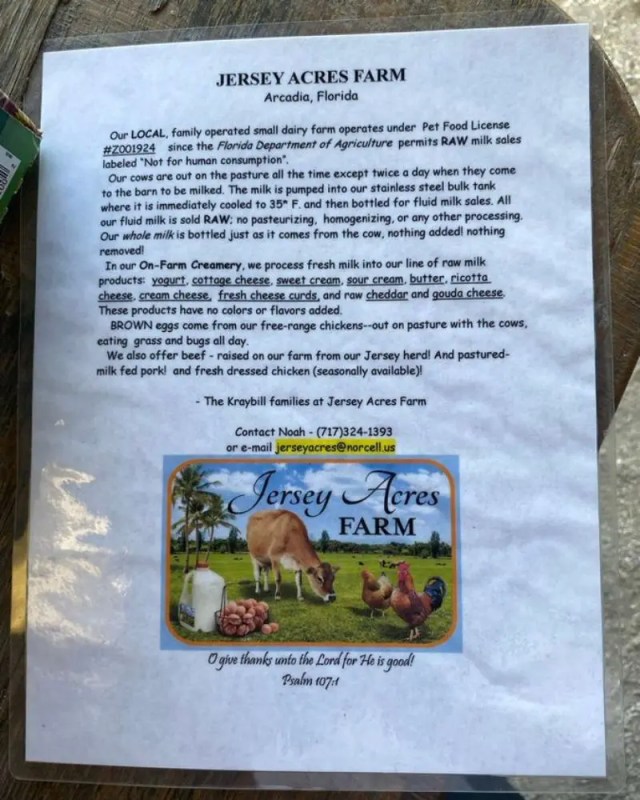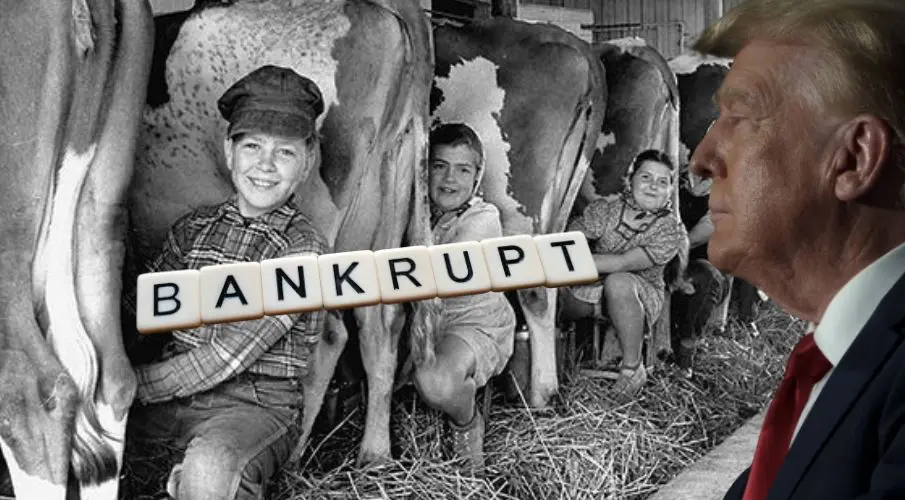There are moments when one wonders whether Donald Trump still knows what he is doing – or whether he has long since become his own contradiction. While his administration calls on farmers, customs officers, and patriots, insisting everything must be "Made in America," the president now wants to import beef from Argentina to lower rising meat prices. A man who once built entire campaigns on the pride of American agriculture suddenly places his bet on cattle from South America.
"We would buy some beef from Argentina," Trump said Sunday aboard Air Force One, as if it were a passing thought and not an economic policy somersault. "If we do that, our meat prices will go down."
What sounds like pragmatic market logic is in truth a political contradiction in itself. The president who has slapped tariffs on almost every imported product now wants open markets precisely where his protectionist dogma was once sacred - in American agriculture. The price of ground beef has risen about 15 percent this year - to almost seven dollars per pound, a historic high. The reasons include extreme droughts, the government’s withdrawal of irrigation aid because there is no climate change, which has reduced cattle herds, as well as Trump’s own tariff and trade policies, which made imports from countries like Brazil more expensive. The fact that the administration now wants to turn to Argentina is, ironically, the result of its own measures.

While the White House props up Buenos Aires with billions in loans and embraces President Javier Milei like a newly won brother in the fight against China, cattle ranchers in Kansas, Texas, and South Dakota see red. They fear that cheap meat from the south will undermine their existence - and that the government is betraying its own market. "This plan only creates chaos in a critical time for American cattle producers while not even lowering supermarket prices," said Colin Woodall, CEO of the National Cattlemen’s Beef Association. He points to a drastic trade imbalance: over the past five years, the U.S. exported about seven million dollars’ worth of beef to Argentina - but imported over 800 million dollars’ worth. And he recalls the old fear of foot-and-mouth disease, which has flared up again and again in Argentina and has made American farmers wary for decades.
Our investigations reveal that ...
Trump, who has categorically excluded climate change from his entire economic policy, has dealt a double blow to American cattle ranchers. While large parts of the country have been hit by increasingly severe droughts, his tariff policy has made precisely those products more expensive that are vital for survival in such times: feed, seeds, machinery, spare parts. What began as nationalist protectionism has become a self-made cage for agriculture. Because Trump denied climate change, irrigation aid was also cut.
"We just found out we’re not going to be able to get any irrigation water - that means the end for us. What we do here is raise cattle, and if we don’t have water, that’s taken away from us. What do you do with dry land where nothing grows anymore? We’re all going to have to go out of business."
In 2024, according to official USDA data, the United States recorded 87.2 million cattle and calves - already the lowest level in more than 70 years. For comparison: under President Biden, the herds numbered just under 95 million animals. Now, after 10 months under Trump, the number has fallen to about 82 million - a level last seen in 1951.

Two dairy farms in North Dakota, both in their fourth generation, have just sold their last cows. Gone. They could no longer compete with cheap imports from abroad while drowning in diesel, feed, and fertilizer costs caused by Trump’s trade policy.
Behind these numbers lies more than an economic crisis: they are an ecological and political symptom. Trump’s ignorance of climatic realities has driven livestock farming in many regions to the brink of collapse. In the Great Plains, in Texas, Kansas, or Nebraska, where entire landscapes are drying up, ranchers have had to sell their herds because the cost of supplemental feed has exploded. The tariffs on imported feed - from soybeans to corn to mineral components - did the rest. Trump’s immigration policy also had devastating effects, as there are simply no workers left on the farms.
Trump-supporting cattle ranchers in Nebraska are flipping out because they’re finding out that they’re about to lose everything! Some of these ranches have been in family hands for centuries - and now they’re losing them because of the man they voted for and his trade and immigration policies.
The consequences of this policy are measurable and existential: fewer animals, higher prices, declining competitiveness. While Trump boasts of "helping the American farmer," reality shows the opposite. His policies have destroyed the very foundation on which livestock farming has stood for generations - water, feed, and time. Meanwhile, about 70 cattle ranchers go bankrupt every day in the United States. In Germany, a party called the AfD dreams of similar economic models. But voters of that party should think very carefully about whether they really want to give their vote for that.
Now comes the coup de grâce
Justin Tupper, president of the United States Cattlemen’s Association, calls it a "catastrophic plan." The South American meat, he warns, could never meet the same quality standards as American beef. "We’re bringing something into the country that destroys our own industry," says Tupper from South Dakota. He fears that meat processors could mix cheap imported beef with U.S. products to drive down prices - and thus undermine the credibility of American agriculture.
Journalists asked Trump what he wanted to say to U.S. cattle ranchers who are currently losing everything. His answer?
"Argentina is fighting for its life... they’re dying."
The government counters, detached from reality, that the market must become more open to curb inflation. But even that sounds half-hearted. Because the logic of this policy works like a roundabout with no exit: Trump’s tariffs drive prices up - and to bring them down again, he now wants to rely on imports he previously fought. Behind the decision lies more than mere market mechanics. In recent months, Trump has courted Argentina with a mixture of patronage and geopolitical calculation. The White House bought pesos, granted the country a 20-billion-dollar credit line, and openly discussed a possible free trade agreement. The fact that beef is now to become part of this relationship is no coincidence - it is a political trade: loyalty for meat, meat for influence.
But the reactions at home show how dangerous this mix is. What was meant as an economic chess move threatens to become a symbol of contradiction - between Trump’s populist promise and his realpolitik tactics. A president who preaches "America First" but imports South American beef because he can no longer control the price of his own policies. While ranchers fight for their existence, Trump speaks of open markets as if they were suddenly a panacea. Yet it is his own policy of isolation that has led to shortages, price spikes, and distrust in the first place.

It is not the first time Trump has thrown his protectionist reflexes overboard when reality knocks too loudly. At the beginning of the year, he already imported eggs from South Korea and Turkey to offset shortages. Now it is beef - and with it the credibility of an entire economic narrative.
"Argentina is fighting for its life," Trump said Sunday. "They have no money, they have nothing. They’re fighting so hard to survive."
Maybe that’s true. But in this fight that Trump is waging for Argentina, he seems to have forgotten that many American farmers are also fighting for survival - and that they don’t need a government that imports the beef of their competitors, but one that finally knows what it wants.
Investigative journalism requires courage, conviction – and your support.
Please also strengthen our journalistic fight against right-wing populism and human rights violations. We do not want to finance ourselves through a paywall so that everyone can read our research – regardless of income or origin. Thank you very much!


Ich lese euren Blog immer mit grossem Interesse. Was mich dabei zunehmend irritiert oder stört, ist, dass Trump in euren Beiträgen immer noch als politisch handelndes Subjekt dargestellt wird. Was er nie war. Der Mann ist psychisch hochgradig krank. Alles, was er sagt und macht, ist selbstrefrentiell. Es geht immer nur um sein Ego. Nur deshalb wurde er überhaupt Präsident: weil ihn Obama einst öffentlich gedemütigt hatte. Eine inhaltliche Analyse seiner Aussagen ist deshalb meines Erachtens zum Scheitern verurteilt. Ganz einfach deshalb, weil ihm die Konsequenzen seines Tuns für andere Menschen scheissegal sind. Was natürlich nichts an der Tatsache ändert, dass sie für die USA und die ganze Welt fatal sind.
Ja genau!
…das nennt man journalistische sorgfaltspflicht und das sind dinge, die gute journalisten von rechten akteuren unterscheidet
Du hast meinen Punkt nicht verstanden: man kann die Worte und Taten einer geisteskranken Person nur hinsichtlich der psychischen Diagnosen analysieren, nicht aber als Ausdruck eines politisch handelnden Subjekts. Trump hingegen ist für alle sichtbar komplett irr und würde „normalerweise“ in einer psychiatrischen Klinik leben. Das Problem ist, dass ihn die Amerikaner zu ihrem Präsidenten gewählt haben. Und zwar hauptsächlich deshalb, weil seine Gegnerin intelligent, schwarz und auch noch eine Frau war. Das heisst nicht, dass ihr keine gute Arbeit macht.
Als erstes muss man sagen, dass jetzt genau die Jammern und Pleite gehen, die zu 90% Trump gewählt haben.
Obwohl der Weg schon in der 1. Amtszeit vorgezeichnet war.
Das passiert, wenn man Generationenideologie (wir haben immer republikanisch gewählt) über Logik und gesunden Menschenverstand stellt.
Zig Farmer verlieren ihre Lebensgrundlage, ihr Grund und Boden.
Etwas was über Jahrzehnte mit harter Arbeit aufgebaut wurde.
Reiche Typen kaufen das Land auf.
Die Farmer dürfen dann da vielleicht für einen Hungerlohn arbeiten.
Wenige Reiche halten dann die Lebensmittelversorgung in der Hand … erinnert mich an „The Hunger Games“
Aber richtig absurd.
Nun stellt Trump den Farmern 1 Milliarde als Hilfen in Aussicht.
1. Ist das ein Tropfen auf dem heißen Stein
2. Müssten die Demokraten nur den Shutdown beenden. Sonst gibt es kein Geld.
Also nutzt Trump es wieder nur als Instrument um gegen die Demokraten zu hetzen.
Geld werden die Farmer trotzdem nicht sehen. Zumindest nicht in der erforderlichen Höhe.
Während die Farmer zugrunde gehen, unterstützt Trump Argentina.
Heißt es jetzt Make Argentina great again?
👍
Trump ist in jeder Hinsicht der personifizierte Ruin für Amerika.😏😢😡
…das würde ich so zu 100% unterschreiben